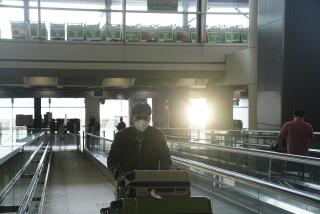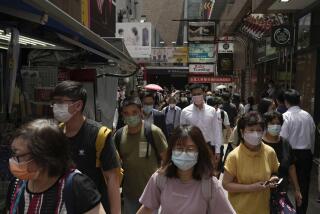With a Takeover in the Air, Rooms Are in Great Demand
- Share via
The whole world will be watching when the United Kingdom hands Hong Kong over to China on June 30, 1997, and for thousands of travelers it’s apparently not enough to watch from a distance.
Tour operators and hotel representatives say travelers are rapidly grabbing up Hong Kong accommodations for the island’s last six months as a colonial outpost and for the first days following the hand over.
“We just don’t have enough space to sell,” says Peter Yeung, president of New Jersey-based Pacific Bestour. The 15-year-old company sent about 16,000 Americans to Asia this year, and is forecasting a 20% increase in 1997, thanks largely to the Beijing takeover and increasing popularity of Yangtze River cruises.
“When I pull up June 22 to 30 [on the computer that looks for flight availability by date], I get nothing but zeros,” says Cynthia Klein, travel agent at Your Travel Center/Carlson Wagonlit in Goleta (telephone [800] 874-8889). This year’s leisure demand is compounded by Hong Kong’s perennially heavy traffic among business travelers.
All this interest in Hong Kong comes amid widespread fears that China’s leaders could crack down on the high-priced, high-flying lifestyle of the longtime British colony, which holds one of the world’s greatest concentrations of skyscrapers and one of its highest ratios of Rolls-Royces per capita. Leisure travelers are clearly drawn by the prospect of participating firsthand in a historic transaction, even if the outcome is uncertain. And the travel industry is capitalizing on that attraction.
At Hong Kong’s Marco Polo and Prince hotels, where lowest rates for fall 1996 were listed at about $250 per room, changeover packages require stays of at least five nights at about $330 nightly. At the Hong Kong Hotel, part of the same chain, a $265-per-night double room, its cheapest, will leap to about $415. And these, industry insiders say, are relatively conservative price boosts. Routinely, tour operators say, prime Hong Kong properties are charging changeover rates at $300 to $500 per person per night. Sometimes breakfast is included.
After hearing of those rates and searching her computer for June flights, travel agent Klein was delighted to find a package arranged by the tour-packaging arm of Asiana Airlines: Rates begin at $1,997 per person for five nights’ lodging, breakfasts and round-trip coach air fare between Los Angeles and Hong Kong. She doesn’t expect the openings to last long.
At San Diego-based Japan & Orient Tours (tel. [800] 877-5223), which takes about 10,000 Americans to Asia yearly, Hong Kong has been the focus of a three-year strategic planning effort: Every chance it got, the company blocked more hotel rooms for the transition.
“It was a big gamble, but it has paid off,” says C.J. Dennett, vice president for marketing. “We have had tremendous interest.”
By late December, the company had blocked more than 300 rooms in eight Hong Kong hotels and was offering them as part of a “Historic Handover Tour.” About half of the available spots have been taken already, Dennett says, and another surge in reservations is expected in January. Prices range from about $2,600 per person for five nights in the Kowloon area’s Park Hotel (double occupancy, air fare from Los Angeles included) to $4,800 per person for six nights in the posh Mandarin Oriental Hotel on Hong Kong Island.
The push to visit Hong Kong during its transition is unusual, but it’s not the first such tourist phenomenon in modern China. For the last three years, as Chinese laborers have advanced through early tasks on the world’s largest hydroelectric project, a dam in the Three Gorges area of the Yangtze River, demand for cruises on the river has boomed. The great motivator: In coming years, the dam is expected to raise the river’s waters dramatically, submerging a chunk of the river’s most scenic stretch and forcing the abandonment of dozens of long-standing riverside towns. Nothing sells faster, it seems, than the chance to watch China’s future overwhelm its past.
Given the scarcity of hotel rooms and the onetime nature of the hand over, travelers considering tours should take care to use a tour operator with a strong reputation and substantial experience with that destination. Those companies are the ones likely to have a secure grip on the most rooms at the best rates. Experienced Hong Kong hands also say that if travelers are intrigued by Hong Kong in 1997 but wary of the hand-over prices and political uncertainty, they may want to focus instead on travel around Chinese New Year (Feb. 7, 1997) or the Easter holiday (March 30, 1997).
“In those periods, there aren’t that many businessmen over there,” says Yeung of Pacific Bestour (tel. [800] 688-3288). Pacific Bestour’s tours before the hand over run in the $900 to $1,200 range per person for packages including air fare and five or six nights’ lodging.
Meanwhile in Hong Kong, many details remain unclear. The ceremonial transfer of power is expected to take place June 30 in the grand foyer of the Hong Kong Convention and Exhibition Center, a landmark harbor-front building. Beyond that, “there will be some kind of celebrations, but we don’t know about them yet,” says a spokeswoman for the Hong Kong Tourist Assn. “The government has formed an organization to deal with that.”
Reynolds travels anonymously at the newspaper’s expense, accepting no special discounts or subsidized trips. He welcomes comments and suggestions, but cannot respond individually to letters and calls. Write Travel Insider, Los Angeles Times, Times Mirror Square, Los Angeles 90053 or e-mail chris.reynolds@latimes.com.
More to Read
Sign up for The Wild
We’ll help you find the best places to hike, bike and run, as well as the perfect silent spots for meditation and yoga.
You may occasionally receive promotional content from the Los Angeles Times.







